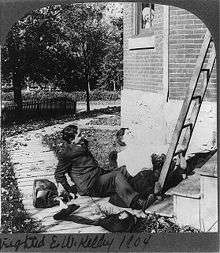Elopement

To elope, most literally, means to run away and to not come back to the point of origin.[1] More colloquially, elopement is often used to refer to a marriage conducted in sudden and secretive fashion, usually involving a hurried flight away from one's place of residence together with one's beloved with the intention of getting married.
Today the term "elopement" is colloquially used for any marriage performed in haste, with a limited public engagement period or without a public engagement period. Some couples elope because they wish to avoid objections from parents, or religious obligations. In addition, the term elopement is used in psychiatric hospitals to refer to a patient leaving the psychiatric unit without authorization.
Examples
United Kingdom
In England, a legal prerequisite of marriage is the "reading of the banns" — for the three Sundays prior to the intended date of the ceremony, the names of every couple intending marriage has to be read aloud by the priest(s) of their parish(es) of residence, or the posting of a 'Notice of Intent to Marry' in the registry office for Civil ceremonies. The intention of this is to prevent bigamy or other unlawful marriages by giving fair warning to anybody who might have a legal right to object. In practice, however, it also gives warning to the couples' parents, who sometimes objected on purely personal grounds. To contravene this law, it is necessary to get a special licence from the Archbishop of Canterbury — or to flee somewhere the law did not apply, across the border to Gretna Green, Scotland, for instance.
Philippines
In the Philippines, elopement is called "tanan".[2] Tanan is a long-standing practice in Filipino culture when a woman leaves her home without her parents' permission to live a life with her partner. Usually she will elope during the nighttime hours and is awaited by her lover nearby, who then takes her away to a location not of origin. The next morning, the distraught parents are clueless to the whereabouts of their daughter.[3] Tanan often occurs as a result of an impending arranged marriage or in defiance to parents' dislike of a preferred suitor.
See also
| Look up elope or elopement in Wiktionary, the free dictionary. |
| Wikimedia Commons has media related to Elopement (marriage). |
References
- ↑ Merriam-Webster Online Dictionary, elope.
- ↑ Anton de Gracia (2011-09-21). "Tanan - Filipino Culture by The Pinoy Warrior". Thepinoywarrior.com. Retrieved 2013-03-22.
- ↑ Anton de Gracia. "Filipino Culture". Thepinoywarrior.com. Retrieved 2013-03-22.